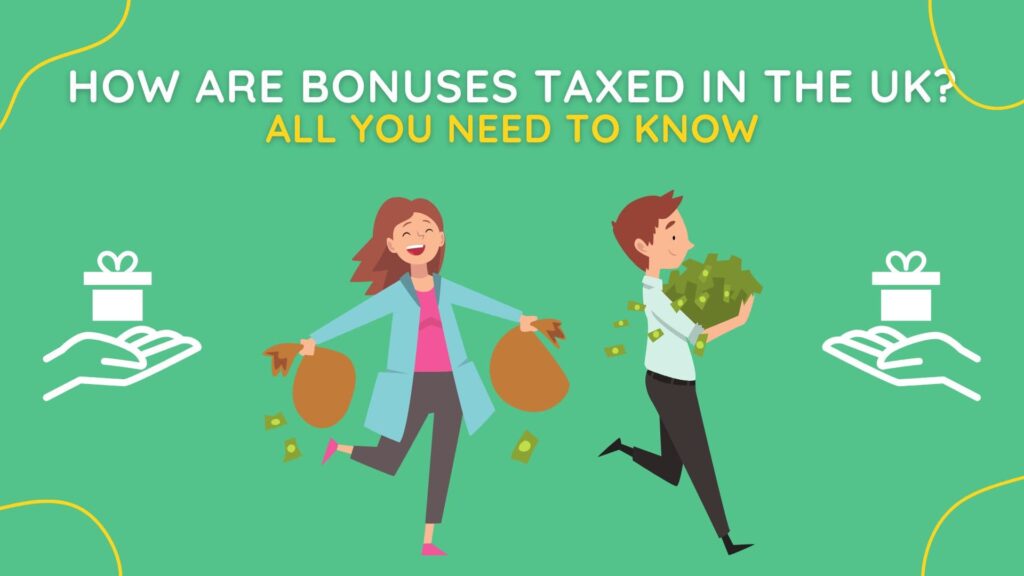
Sammie Ellard-King
I’m Sammie, a money expert and business owner passionate about helping you take control of your wallet. My mission with Up the Gains is to create a safe space to help improve your finances, cut your costs and make you feel good while doing it.
So, how are bonuses taxed in the UK, and what does it mean for your money? Let’s dive in!
Well done…you’ve smashed it at work and earned some extra cash on top of your salary. It’s a cause for celebration, but the question always lingers how much of my bonus do I get?
We all worry about paying the correct tax, as His Majesty’s Revenue & Customs (HMRC), the actual tax department, still manage to mess it up every year.
I’ve yet to have a year where I haven’t had to pay tax back or landed a tax rebate if I’m lucky. It’s never bang-on.
Simply put, bonuses are taxed like your regular salary and are subject to income tax brackets and national insurance payments.
There is, however, a lot more to it and creative ways to limit the amount of tax you pay on your bonus and in some cases pay none.
Read on to find out more!
Table of Contents
How are bonuses taxed in the UK?
Working out how your bonus is taxed in the UK can be tricky, but it’s important to note that your employer will handle this directly with HMRC (His Majestys Revenue & Customs).
You don’t have to lift a finger other than checking for mistakes on your paycheck.
Income tax is your salary and bonus, taxed on any income you receive from your employer.
The first £12,750 is tax-free, but then you’ll pay 20% on anything after that up to £50,270, 40% on anything above that up to £150,000, and 45% above £150,000.
You’ve probably seen a lot in the news on taxation and national insurance rates recently, which is why it’s essential to keep up, as it could affect your bonus payments.
Often they announce changes around when the UK Chancellor delivers his yearly budget, but there are times when changes are made throughout the year.
How does income tax work?
Let’s start with this income tax table that shows you what we pay in England, Wales & Northern Ireland.
| Tax Band | Income Range | Tax Rate |
|---|---|---|
| Personal Allowance | Up to £12,570 | 0% |
| Basic Rate | £12,571 to £50,270 | 20% |
| Higher Rate | £50,271 to £150,000 | 40% |
| Additional Rate | Over £150,000 | 45% |
If your bonus takes you into the higher paying tax bracket, you’ll pay the higher tax on the amount over it.
For example, if your £5000 bonus goes into the 40% tax bracket by just £500, then just this £500 is subject to the 40%, and the rest would remain in the lower tax bracket.
Scotland is slightly different, and this is what you pay there.
| Tax Band | Income Range | Tax Rate |
|---|---|---|
| Personal Allowance | Up to £12,570 | 0% |
| Starter Rate | £12,571 to £14,667 | 19% |
| Basic Rate | £14,668 to £25,296 | 20% |
| Intermediate Rate | £25,297 to £43,662 | 21% |
| Higher Rate | £43,663 to £150,000 | 41% |
| Top Rate | Over £150,000 | 46% |
Why is Scotland’s income tax brackets similar to the UK’s but so much more complicated?
Well, they are trying to help young people and lower incomes get more back from tax, but it’s actually more expensive to work for a Scottish company if you’re earning decent money.
Does National Insurance affect my bonus?
The National insurance payment for bonuses is much easier to navigate as the brackets are fixed. So for your bonus, you’ll pay the rates listed below.
For example, if you have a £10,000 bonus and are already over the £50k threshold, you’d only pay 2% national insurance on this bonus payment.
Do student loan repayments affect my bonus?
Unfortunately, your bonus payments are also subject to student loan deductions, just like your regular salary. Your student loan repayments are a percentage of your paycheck; the more you earn, the more you pay back.
Whilst this may be frustrating, it will pay off your student loan faster.
Does my pension affect my bonus?
Yes, it will affect your bonus payments if your company is signed up for a percentage salary contribution. It’s essential to check with your HR Manager or Finance Manager about the pension scheme you are on.
If you opt-out of a pension contribution from your employer, it won’t affect your bonus.
Do child benefits affect my bonus?
Not if you earn under £50,000. If you claim child benefits and make above £50,000, you’ll pay a 1% charge on your child benefits for every £100 earned. Child benefit payments stop when you reach £60,000 as the child benefit payments will stop.

What about higher earners?
Tax on bonuses in the UK for higher earners can be astronomical. Simply put, you pay more in tax for earning more (as it should be), but if you’re in that bracket, it’s never pleasant.
There is a 60% tax rate for those earnings of £100,000 – £125,000.
Weird right?! But we dug into this, and it’s true!
Once you reach £100,000 per year, every £2 you earn over this until you get to £125,000 lowers your tax-free personal contribution (£12,750) by £1.
This works out roughly to be 20% extra tax just for falling into this bracket, and once you get beyond £125,000, the tax-free personal contribution disappears altogether!
Can you avoid paying tax on your bonus?
Yes, there is a way, and it’s called a bonus sacrifice. A bonus sacrifice means your employer pays your bonus directly into your company or personal pension, so you do not pay tax.
Firstly, you need to ensure your employer is willing to allow you to make bonus sacrifices. It shouldn’t be a problem for them, but you should always check.
Secondly, you’ll need to check with your provider that they accept bonus sacrifice payments. Most do but again necessary to check as some don’t.
Let’s look at an example.
If Charlotte were paid £40,000 a year and received a £5,000 bonus from her employer, then she would pay close to 33% in tax and national insurance contributions. This would mean Charlotte’s take-home from her bonus would be close to £3,360 (this doesn’t consider a student loan payment).
With a bonus sacrifice, Charlotte could pay the full £5,000 into her pension and receive complete tax relief on her payments keeping the full £5,000.
The downside is accessibility. You cannot access your pension to start drawing it down until you’re 55.
Essentially you either pay tax to get it now and sacrifice it for your later years. This will be totally dependant on the individual.
Another way, perhaps too extreme for some, is a salary sacrifice on top of their bonus. Essentially you lower the salary rate you receive in your paycheck, and the employer pays the rest (tax-free) directly into your pension.
If you’re annoyed about paying tax then consider putting your bonus to work in the form of a stocks and shares ISA. That way you will be in with a chance to earn the tax back and more with a long term approach to investing.
Conclusion
Tax isn’t the easiest thing to work out, and bonuses certainly add to the confusion, so if you’re worried about what you might get, then take it up with your HR or Finance Manager.
There are ways to pay less tax, and the more you earn, the more you should consider a bonus sacrifice. Essentially if you’re already comfortable, then the extra money might be better off in your pension.
Lastly, if you’re a higher earner, then be wary of the lifetime pension contribution of £1,073,100, or you will be liable to pay a lifetime allowance change.
Share this article with friends
Disclaimer: Content on this page is for informational purposes and does not constitute financial advice. Always do your own research before making a financially related decision.


